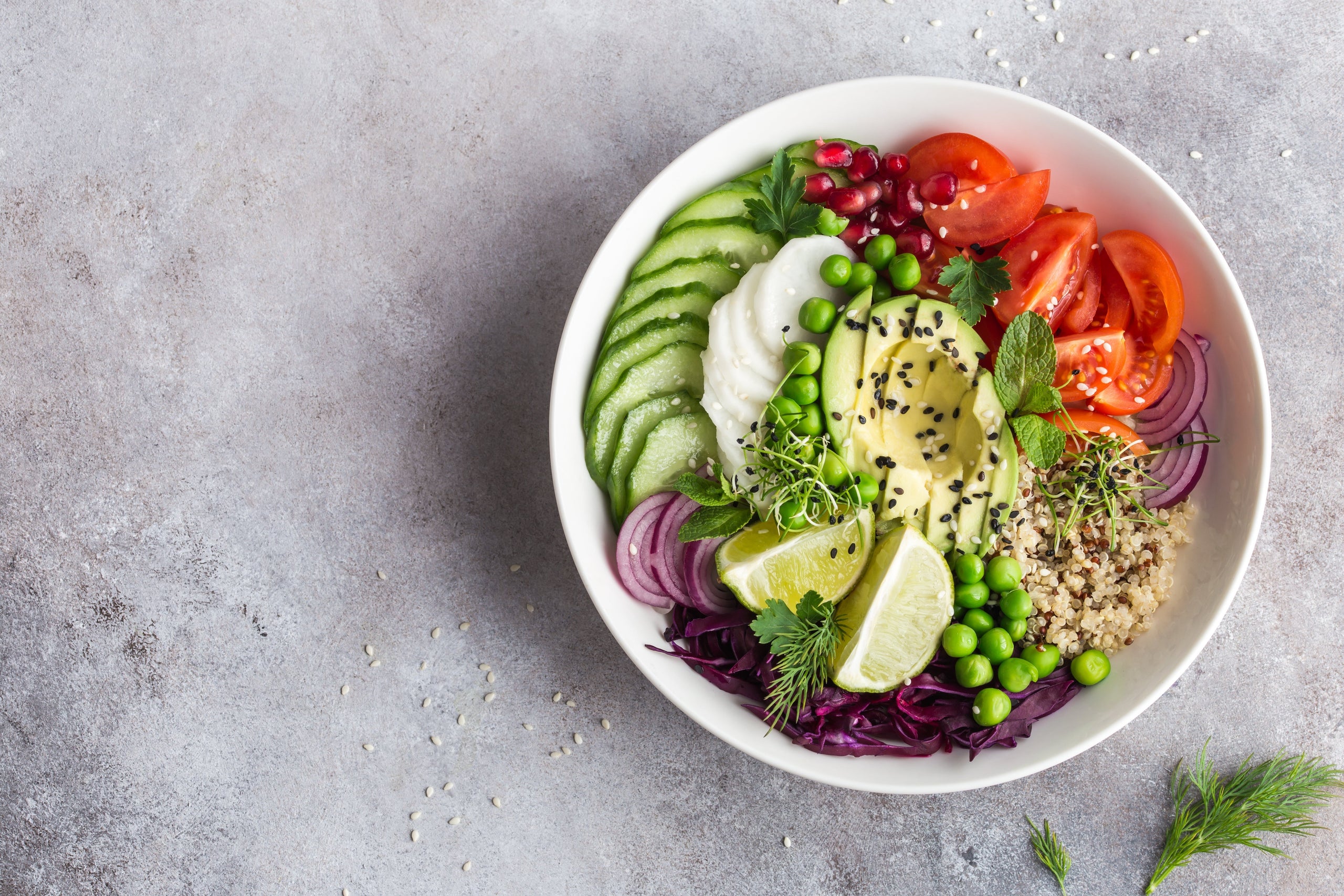
Balancing Blood Sugar Levels Naturally
8 Min read
Blood sugar management is a widely talked about topic in the wellness world and is getting a lot of high level attention from industry experts such as Tim Spector and Glucose Goddess, Jessie Inchaushé. And quite rightly so, it affects so many people on a daily basis and contributes to many aspects of our health and wellbeing. Specifically, it can help you to cope with stress and brain fog, prevent Type 2 Diabetes alongside some other chronic diseases, as well as improve your physical and mental performance and aid weight loss.
Blood sugar dysregulation is often triggered by an imbalance of macros: too many carbs or glucose rich foods and not enough protein, fibre or fats. Even poor eating habits, increased stress levels and a lack of sleep can affect it; all of which are directly tied to increased inflammation, ageing, weight gain and hormonal imbalances.
So, what is blood sugar balance?
Glucose is our body's preferred source of energy and every cell in our body uses glucose (sugar) to perform its function. When we eat, food gets broken down to produce this sugar which enters our bloodstream - different types of foods cause different levels of sugar to enter our body. Because high levels of sugar can be damaging, and in order to maintain healthy levels within our body, our pancreas releases a hormone called insulin which moves sugar out of the blood and into our cells when they need it, or store it ‘safely’ for later. When we eat foods high in sugar (carbohydrates - sugary and starchy foods) our levels rise higher than our body needs, which causes insulin to store excess sugar in our liver and in our fat cells, leading to a crash - not an ideal outcome.
If however, we pay more attention to eating the right foods and at the right time, we can significantly manage our blood sugar levels naturally. If for example, you have fibre at the start of a meal it will prevent a spike in blood sugars as the human body is unable to absorb or break down fibre. In addition, eating each meal with a good serving of protein and/or fat (and of course, less sugar), we get much less of a spike of glucose being released into our bloodstream. If this glucose doesn’t go above our healthy range then no glucose will be stored as fat - a much better all round outcome for our bodies and the way we feel.
It is no surprise, therefore, that balancing our blood sugar and keeping levels within a healthy range is so important for our health and overall wellbeing. If we fail to achieve this balance, symptoms and cravings can take over which can lead to potential health concerns further down the line.

What does blood sugar imbalance feel like?
Most of us will experience some kind of blood sugar imbalance symptoms in our lifetime and some much more than others. Symptoms can range from being mild to extreme. Because poor blood sugar management can affect our entire body, symptoms can often be uncomfortable, exhausting and even debilitating.
Most common symptoms:
- Fatigue
- Sugar and carb cravings
- Weight gain
- Headaches
- Trouble concentrating
- Brain fog
- Mood swings or nervousness
- Dry skin
- Excessive thirst
- Frequent peeing
- Blurred vision
Furthermore, an indication that our blood sugars need a little TLC can include: constantly craving sugary foods, especially an hour or so after mealtimes; feeling tired even when you’ve slept really well all night; relying on caffeine for energy and constantly feeling the need to snack. Uncomfortable symptoms such as irritability, brain fog and feeling spaced out and even feeling lightheaded or shaky before a meal are really disconcerting.
The good news, although blood sugar imbalance is often caused by our diets and lifestyles, it is something we can significantly influence and improve through some positive daily choices. As always, aiming for the all important healthy balance throughout the day really can have such a big impact with the way we feel. Avoiding extreme highs and lows will create a much more balanced body and will ultimately help you feel more energised, focused, satisfied and much calmer.
Ways you can balance your blood sugar levels naturally
Prevention is always better than cure and in the case of your blood sugars, it is always best to try and prevent any spikes and dips before symptoms take control leaving you feeling out of whack. Taking control of our blood sugar levels by making the right tweaks to foods we eat and habits we follow can help us achieve an all important balanced body.
Eating good quality protein, healthy fats + fibre
Protein is by far the most effective way of giving your body the balance and stability it needs throughout the day. It fills you up better than any other nutrient and is easy to add to meals. Including a palm sized portion of protein at mealtimes will not only help keep you fuller for longer but can help prevent cravings keeping you and your blood sugar levels stable.
In addition, if you are someone who does suffer with uncomfortable symptoms, we would recommend never skipping breakfast and always prioritising a serving of good quality protein to kick start your day - greek yogurt, eggs and/or including a serving of collagen or collagyn with your brekkie, morning coffee or smoothie are good options to help balance you from the start of your day.

Healthy fats are another must for supporting blood sugar balance as they are digested relatively slowly, which means they don’t cause the blood sugar to spike the way that sugar and simple carbohydrates do. Healthy fats can also help prevent the blood sugar spikes associated with simple carbohydrates. This is because eating healthy fats alongside carbohydrates helps to stabilise blood sugar as fat slows the absorption of carbohydrates into the blood. Sources of healthy fats include avocados, nuts seeds, fish, olive oil and MCT oil.
Finally, fibre is crucial in helping stabilise blood sugars. If you are someone who suffers with regular symptoms it might be time to switch the order of your foods. Eating fibrous vegetables such as asparagus, courgettes, peppers, broccoli, lettuce, tomatoes, as well as pulses and beans at the beginning of your meal can significantly flatten blood sugar levels, keeping those pesky symptoms at bay.
Focusing on 3 balanced meals
We all know implementing and maintaining a healthy and balanced diet is essential for our health but even more so for helping to balance blood sugar levels. Carbohydrates, more so than proteins and fats, cause blood sugar to spike after eating them as your body quickly breaks down carbs into sugar. It doesn’t mean you can’t eat carbs, it just means you should look to consume carbs that don’t cause a spike in blood sugar levels and balance these with other macros. We recommend choosing whole grains, brown rice, sweet potatoes and berries, while limiting processed breads, pastas and crackers. When you want to enjoy something more refined or higher in sugar (which we all do at times!), take on board some of the tips and tricks you can deploy to help your body process the sugar.
Removing processed foods
Ditching heavily processed and packaged foods from our daily diets is always a good idea and especially if you suffer with your blood sugar levels. Foods such as white breads, white pastas, white potatoes, cakes, biscuits, fizzy drinks, sugary foods, fruits juices, ready meals that are high in sugar, refined grains and carbs, and artificial ingredients and flavourings play havoc with our bodies and send blood sugar levels sky high with quick drops making symptoms worse and hard to manage. Focusing on healthier and more balanced whole-foods such as good quality protein and lots of fresh fruits and vegetables, which not only are packed full of vital nutrients, but also fibre. Fibre can slow carb digestion to help balance blood sugar, and it also plays an important role in our gut health and weight management.

Drink plenty of water
Staying hydrated by drinking enough water can help you control your blood sugar levels, as it helps to flush excess sugar out of your body – we recommend 6 to 8 glasses of water each day. Not drinking enough water can cause the amount of blood sugar in your body to become more concentrated, resulting in high blood sugar levels. So, staying hydrated by regularly drinking every day can help keep your blood sugar levels stable.
Lifestyle tweaks
Whilst nutrition plays a big role in maintaining balanced blood sugar levels, there are some key lifestyle tweaks and healthy habits you can follow to help you maintain healthy blood sugar levels and keep them stable.
Taking a short walk (even as little as 10 minutes) after a meal is a simple yet effective way to reduce glucose spikes because exercise stops the accumulation of glucose in the body.
In addition, managing your stress levels by implementing daily practices such as calming breathwork and meditation techniques, restorative yoga and regular exercise all help contribute to the healthy function of our nervous system which is great for calming our bodies and creating balance. Prioritising your sleep to ensure you allow your body to rest and repair overnight is crucial for how your body copes the next day and will also help you create and maintain balance in your body.

Remember, it is important for all of us to take notice of what we’re eating and how it affects our bodies. No one single food or yoga session is going to be the magic answer but the power of implementing a healthy, balanced diet with plenty of protein, good fats, fibre, minimising processed foods as well as making sure you are moving your body, staying hydrated, well rested and managing stress levels can make a significant difference to the way you feel and help manage your blood sugar levels.
